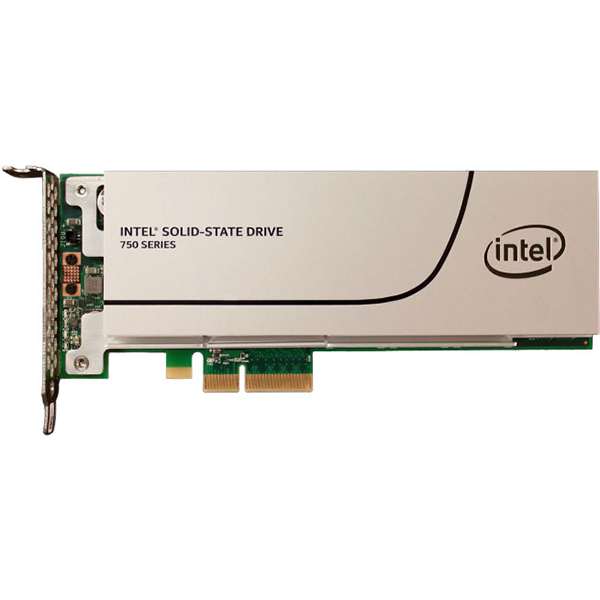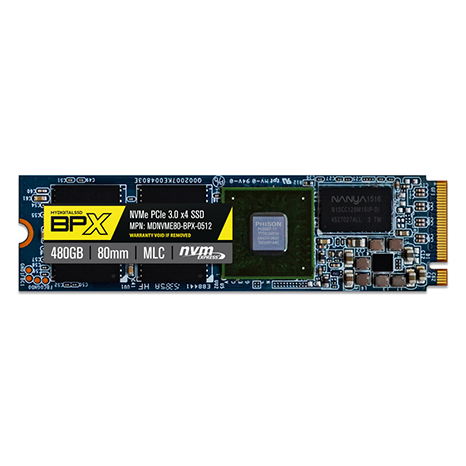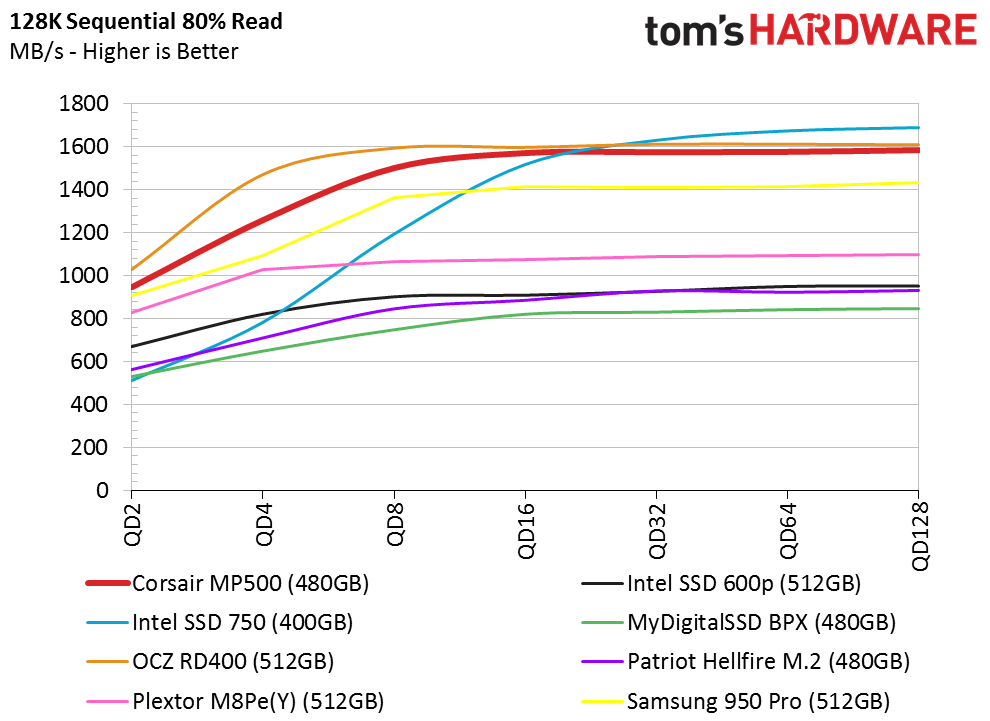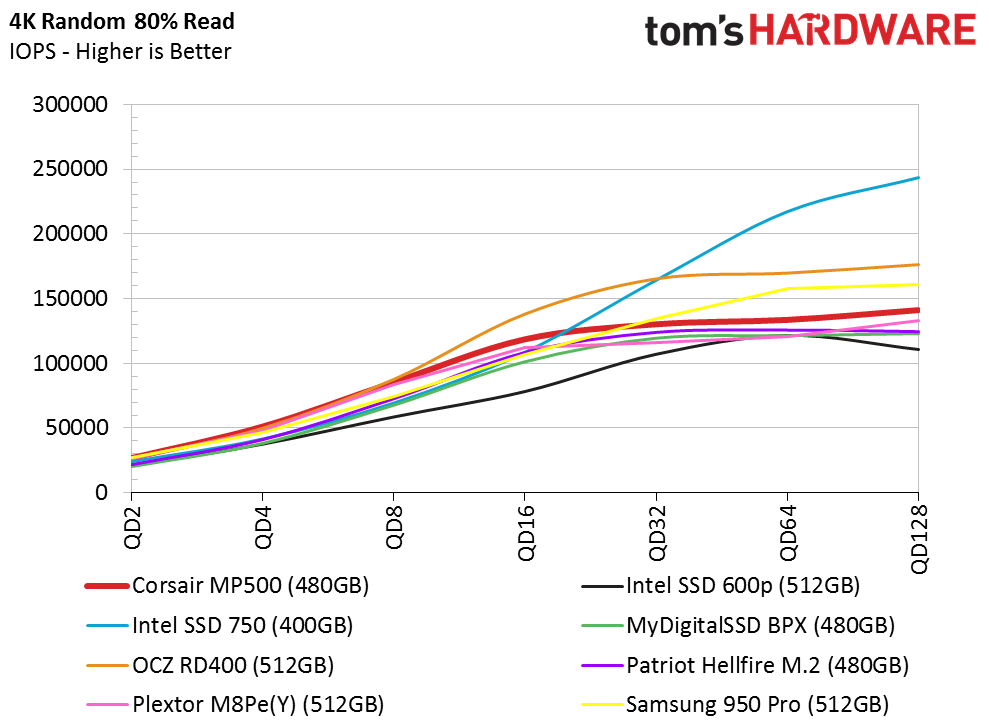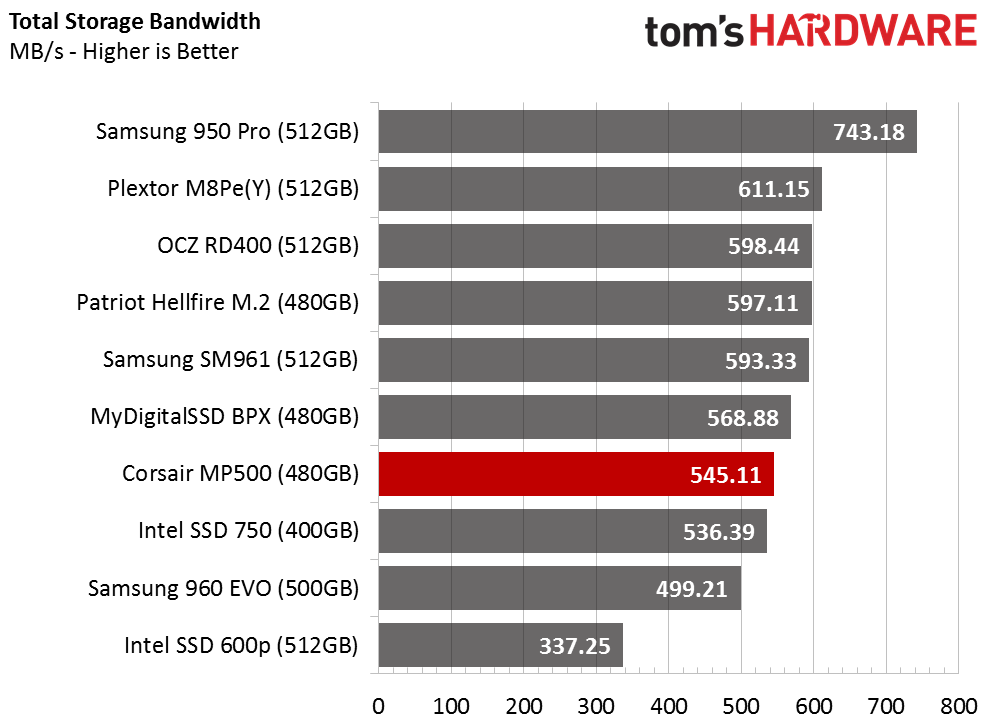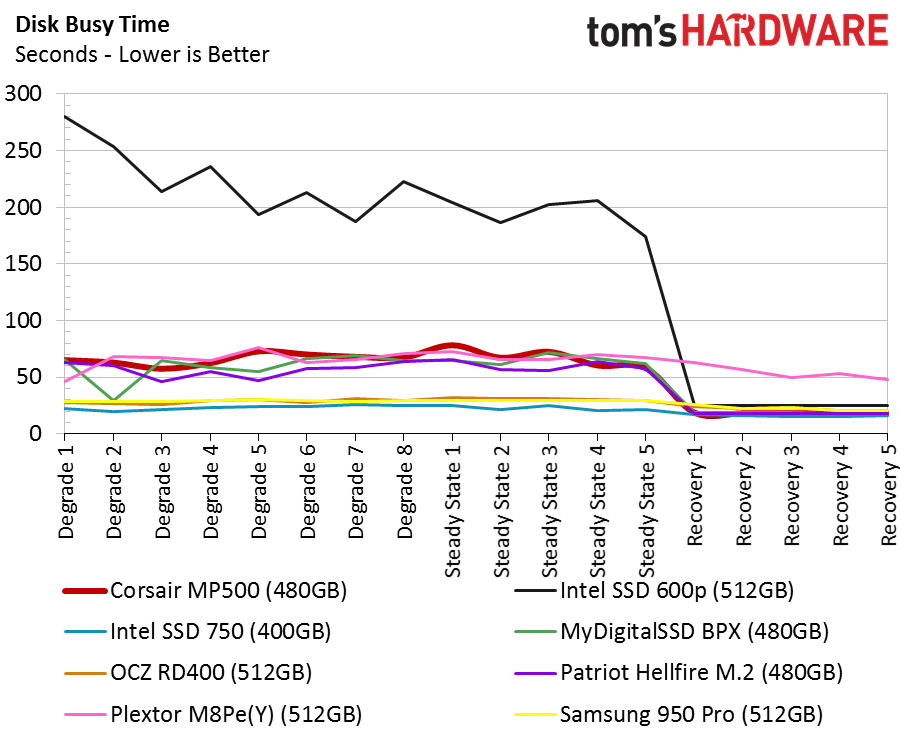Corsair Force Series MP500 M.2 NVMe SSD Review
Why you can trust Tom's Hardware
512GB Performance Testing
Comparison Products
512GB is one of the most popular NVMe SSD capacities. Prices start at $179.99 (Intel 600p) and span up to $358.99 (Samsung 950 Pro). The Samsung 960 Pro 512GB is absent from our charts due to availability. The drive currently sells for a wallet-busting $569.99 at Newegg, but we've seen it at Amazon for $329.99 before selling out at that price (again).
The Force Series MP500 480GB is also one of the more expensive NVMe SSDs on the market. This drive features many of the same basic specifications as the MyDigitalSSD BPX and Patriot Hellfire M.2.
The Plextor M8Pe(Y) makes an appearance in our test pool. The drive was not available in the 256GB capacity when we tested the M8 series. The Y version designates the add-in card form factor with a heavy heatsink to dissipate the Marvell Eldora's high heat output.
The Intel SSD 750 Series add-in card and Toshiba OCZ RD400 are also in our tests. They both fall into the premium category.
Sequential Read Performance
To read about our storage tests in-depth, please check out How We Test HDDs And SSDs. We cover four-corner testing on page six of our How We Test guide.
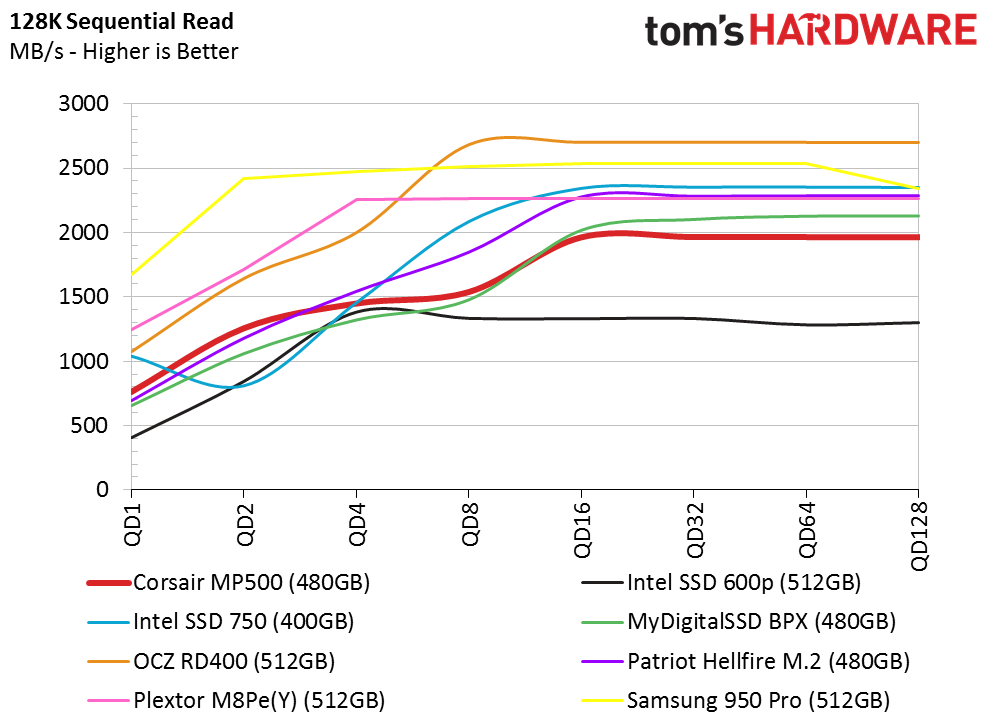
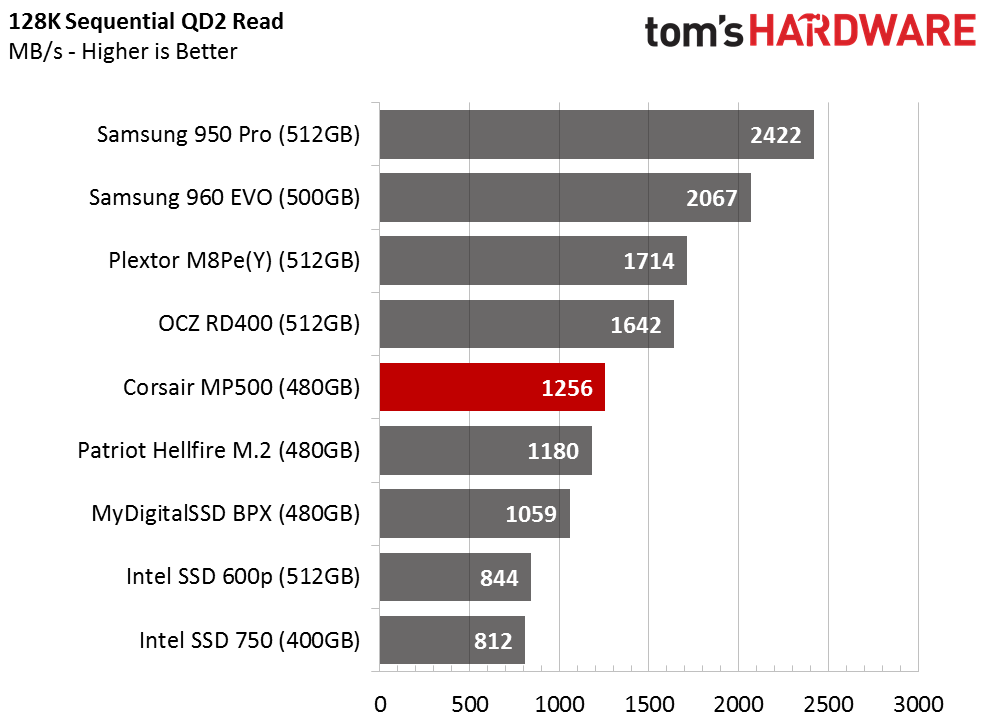
Moving up a capacity point generally doubles the number of NAND die available to the controller. This increases parallelization, so performance often increases with more die. The low-latency NVMe protocol in tandem with the high-throughput PCI Express bus can ratchet up performance quickly at lower queue depths.
We hope to see the MP500 separate itself from the other E7 drives at some point. The sequential read test doesn't show that as the three drives group together. At QD2, the MP500 squeaks ahead of the other E7 drives. The rest of the competition is more formidable.
Get Tom's Hardware's best news and in-depth reviews, straight to your inbox.
Sequential Write Performance
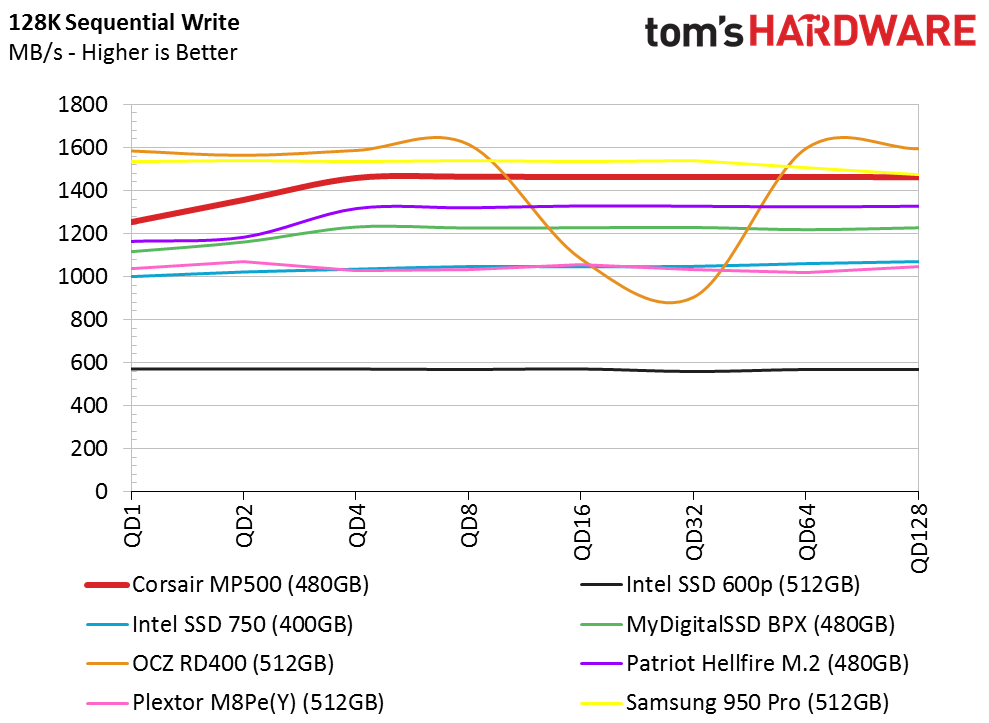
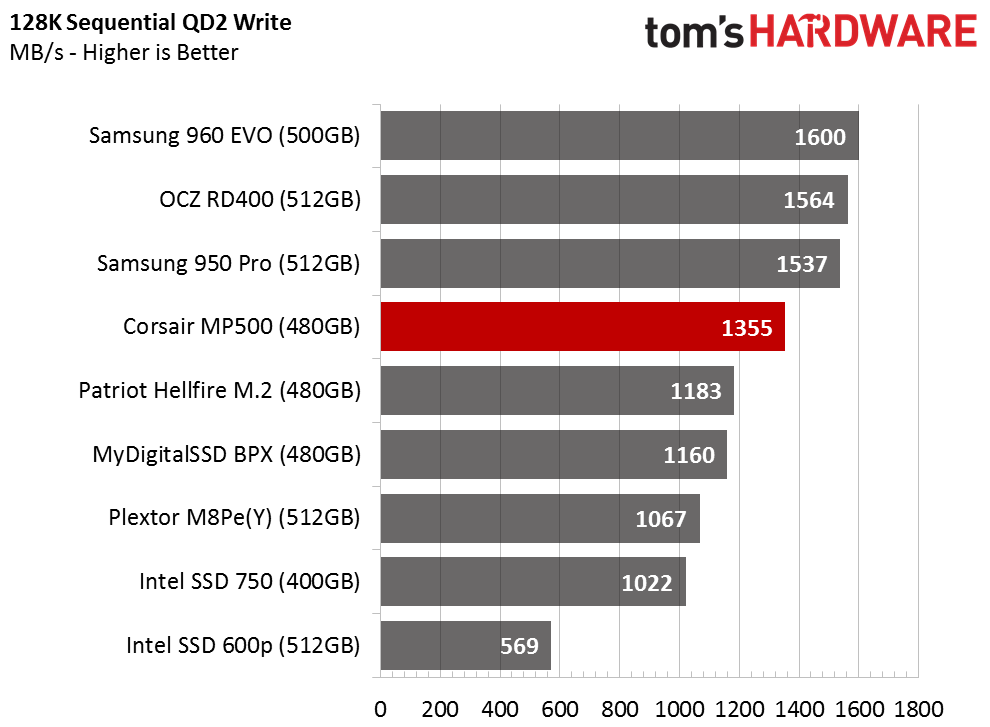
The MP500's sequential write test reveals increased performance over the previously-released E7 SSDs. The 480GB model closes the gap on the Samsung and OCZ drives, but it still trails them by a fair margin.
Random Read Performance
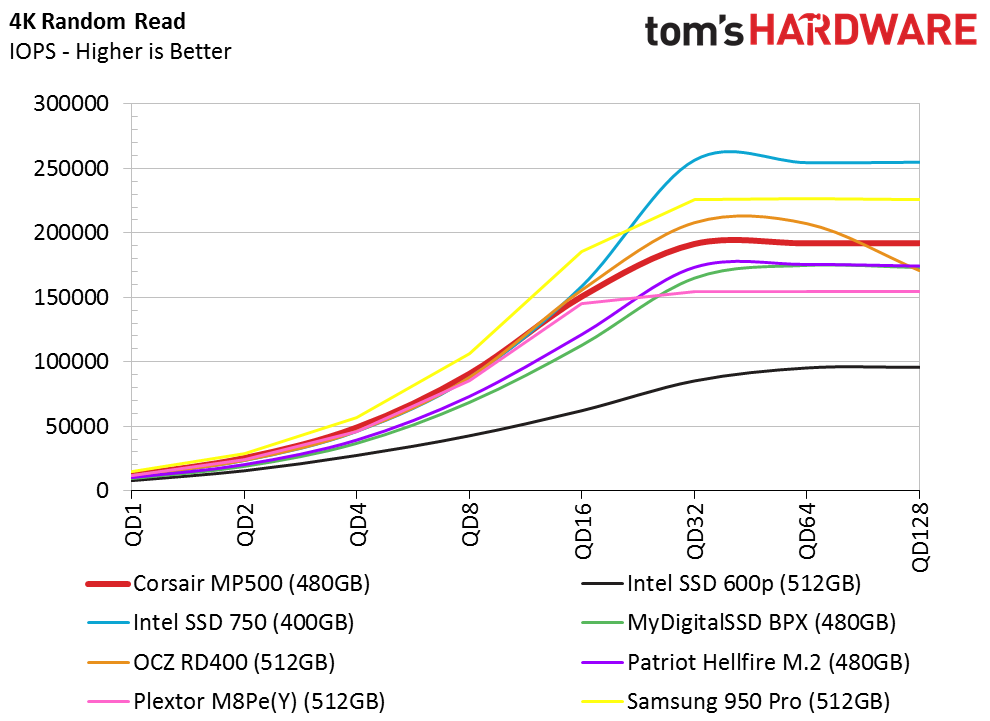
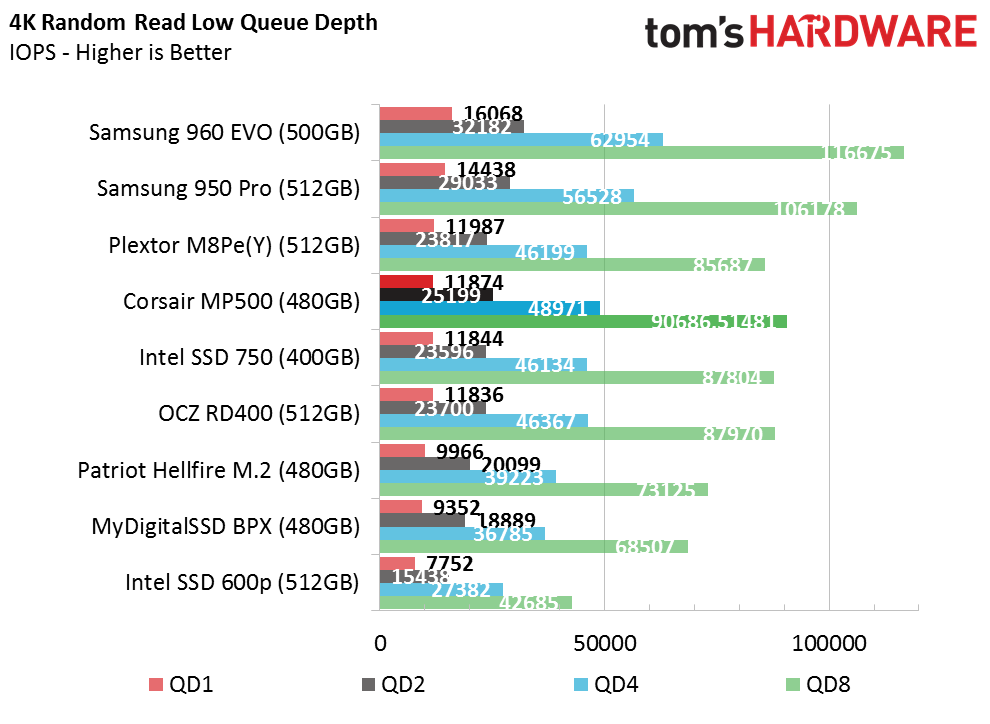
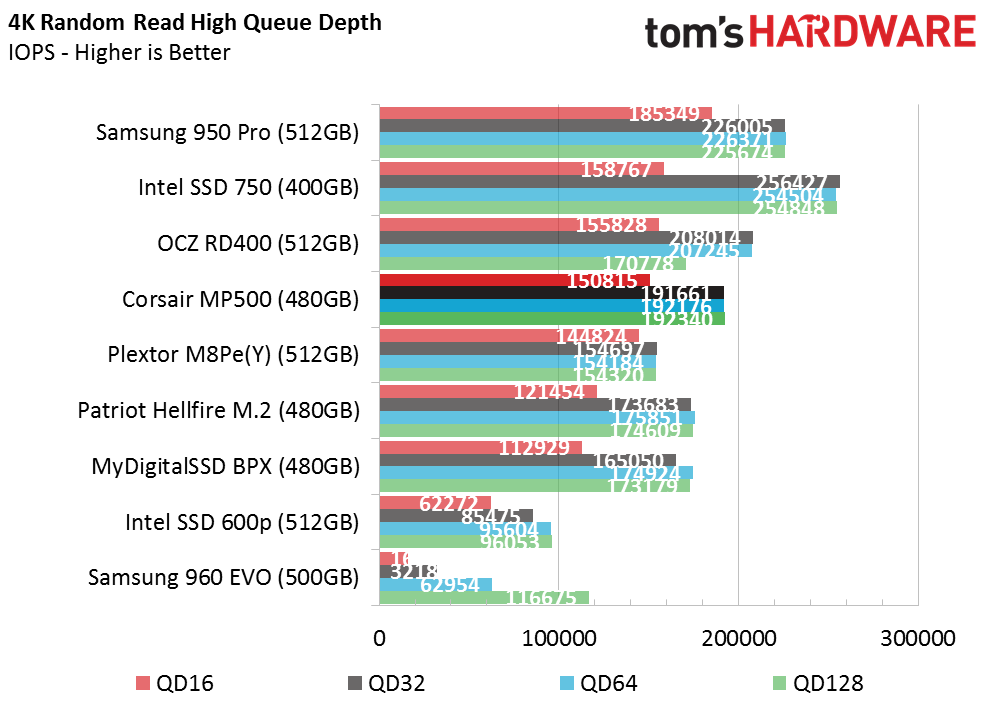
The Force Series MP500's random read performance nears 12,000 IOPS at QD1. The drive trails the 960 EVO (16,000) and 950 Pro (14,000), and that lower level of performance may show up later in the review during our real-world software tests.
Random Write Performance
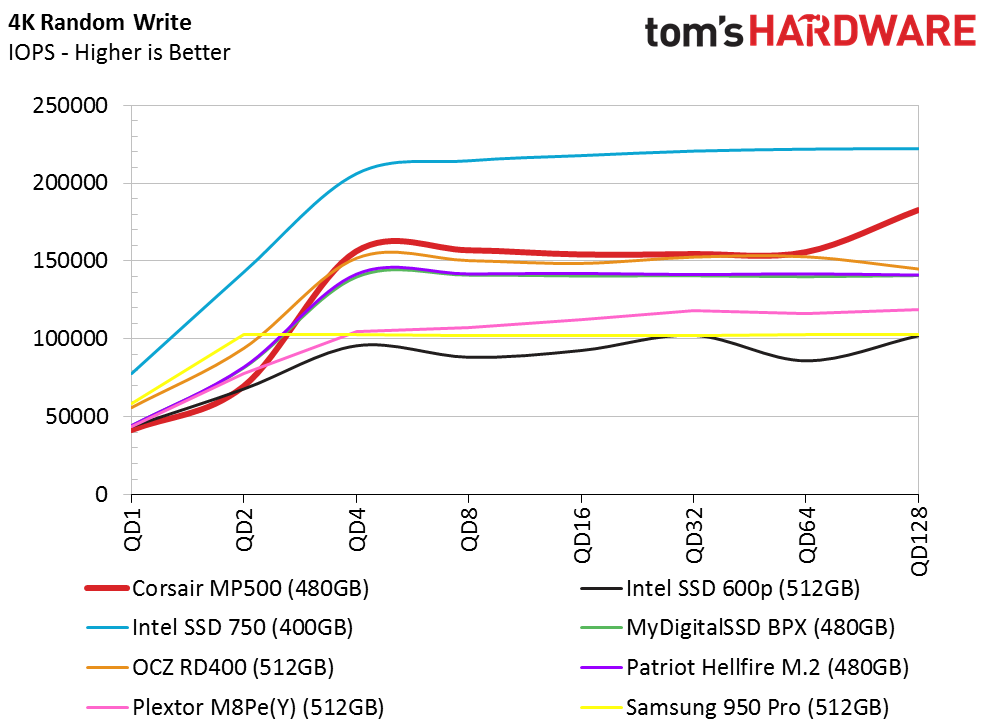
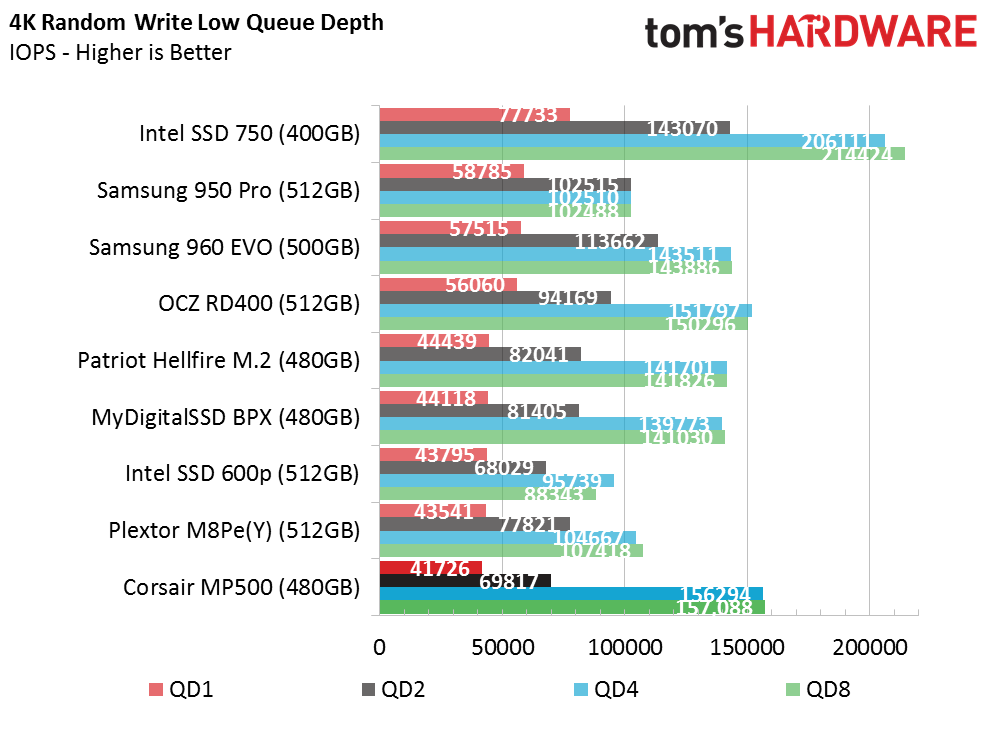
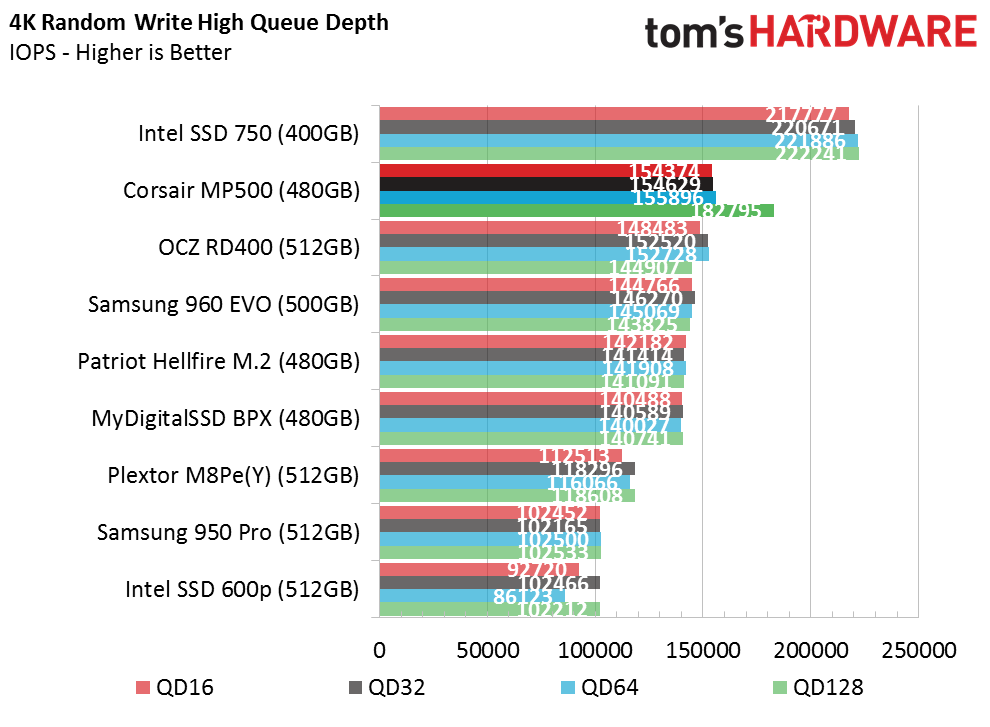
The Corsair Force MP500 480GB has a low score in the random write tests at low QD. By QD4, the MP500 turns the tables and outpaces every other M.2 drive. The only model with higher random read performance is the enterprise-derived Intel 750 Series 400GB. Corsair relies on Microsoft's NVMe driver, so Windows handles the host-side power management. We've asked for a Phison NVMe driver for the last year to help increase random performance, but as of yet, the custom driver doesn't exist.
80 Percent Sequential Mixed Workload
We describe our mixed workload testing in detail here and describe our steady state tests here.
The MP500 480GB delivers exceptional mixed sequential performance outside of steady-state conditions. This is a change from the 240GB model's underwhelming performance.
80 Percent Random Mixed Workload
The random mixed workload performance is very good, but the MP500 doesn't pull away from the other drives like it did in the previous test.
Sequential Steady-State
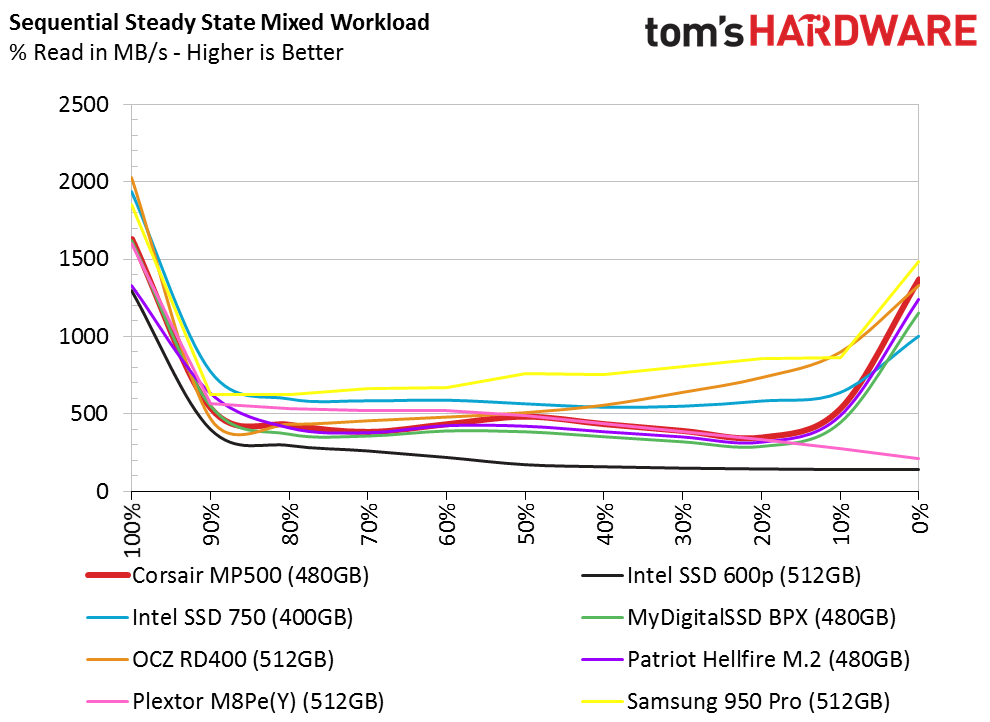
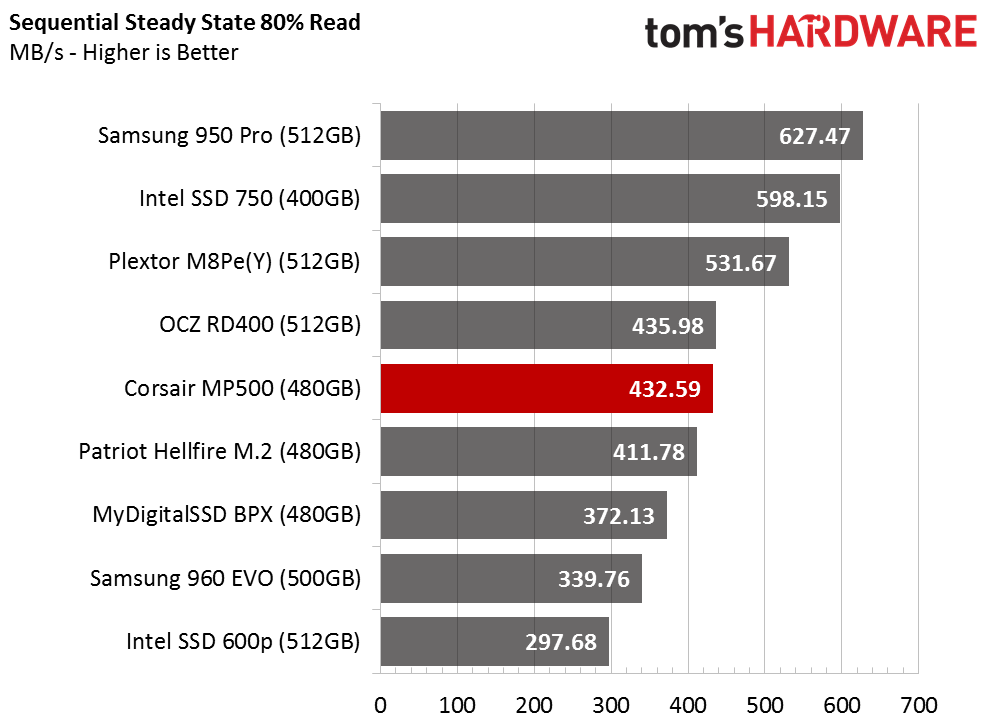
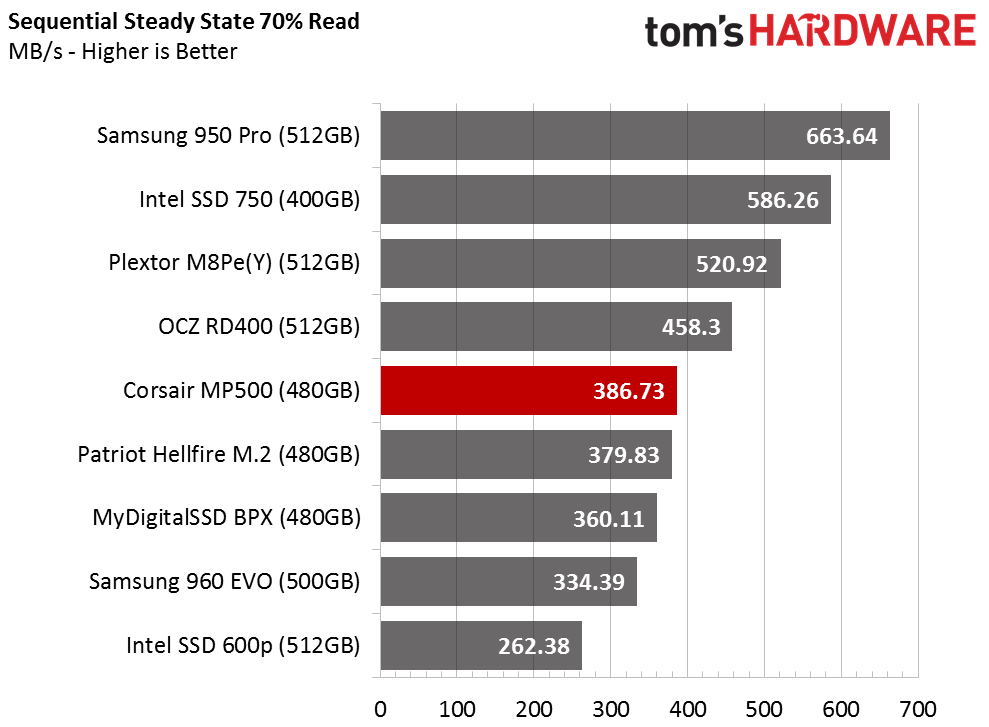
The three Phison E7 SSDs deliver roughly the same sequential steady-state performance. There is a nice bump at the 50-percent read mark, and that works in favor of users performing heavy video editing with large files that aren't CPU-restricted by plugins.
Random Steady-State
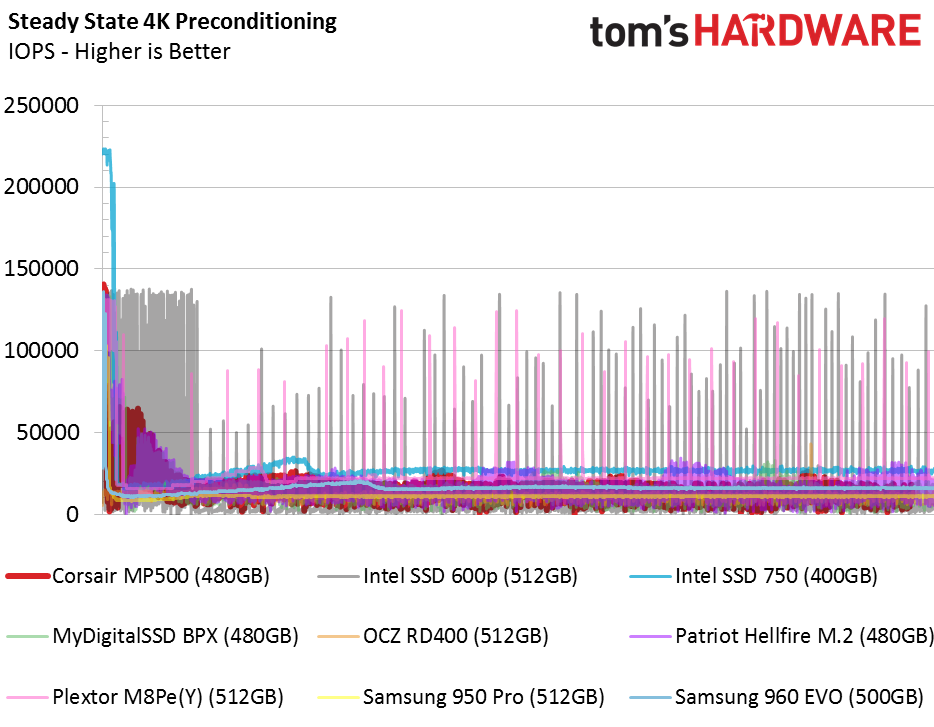
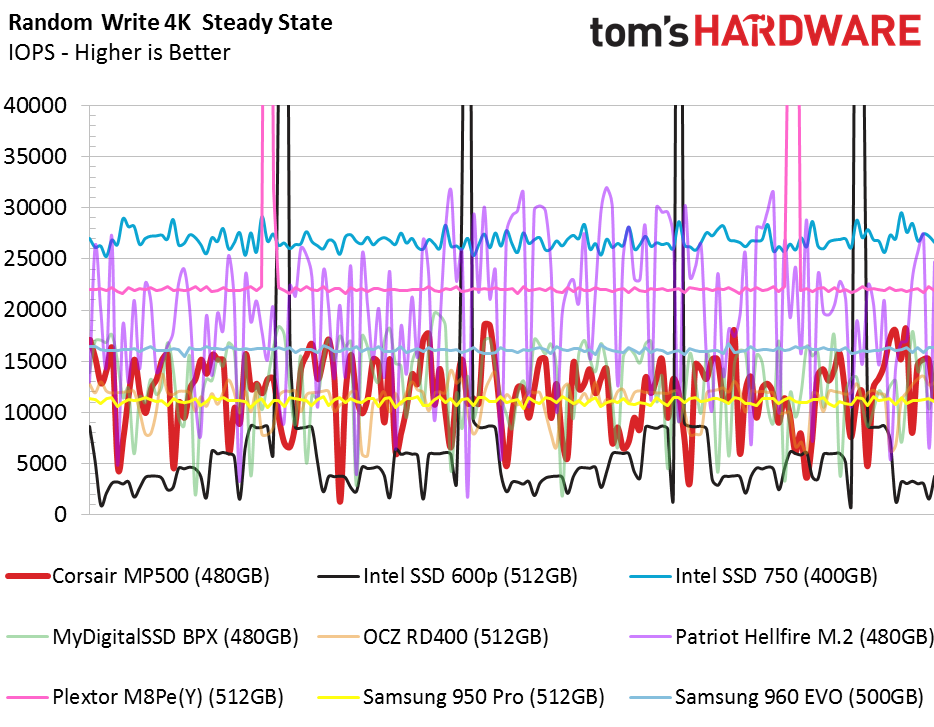
The MP500 480GB doesn't top the random write steady-state chart like the smaller drive we tested, but it still delivers an excellent showing. The performance isn't as consistent as many of the other high-performance NVMe SSDs, an issue that we would like to see Phison focus on in the future. This is an issue we've come to expect from Phison-based controllers, but the company has made progress on random data performance over the last several years.
PCMark 8 Real-World Software Performance
For details on our real-world software performance testing, please click here.
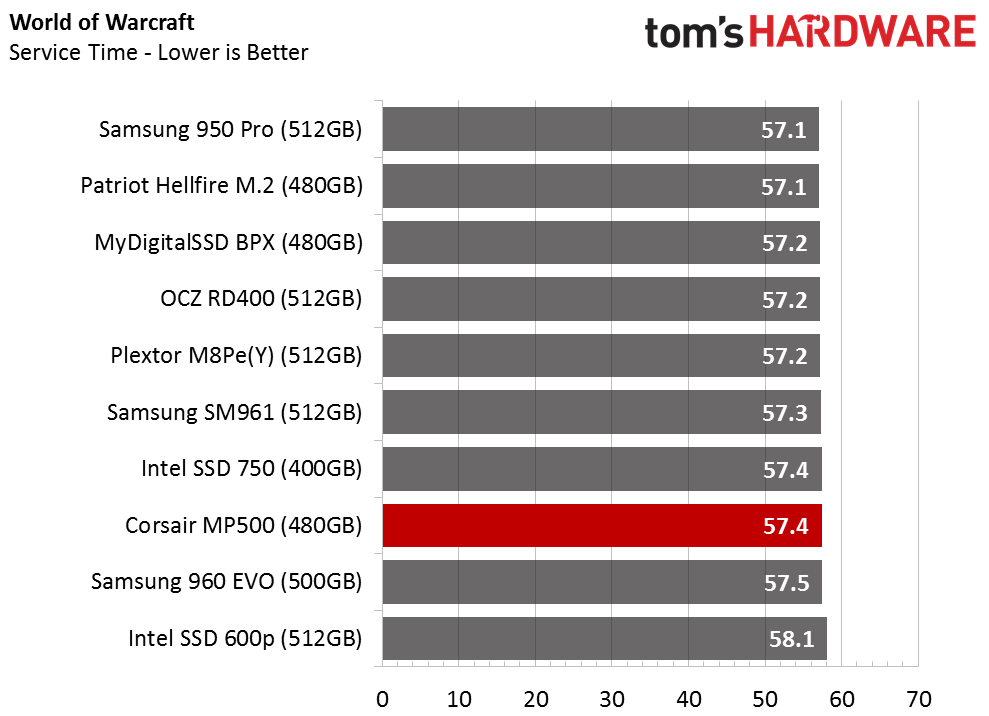
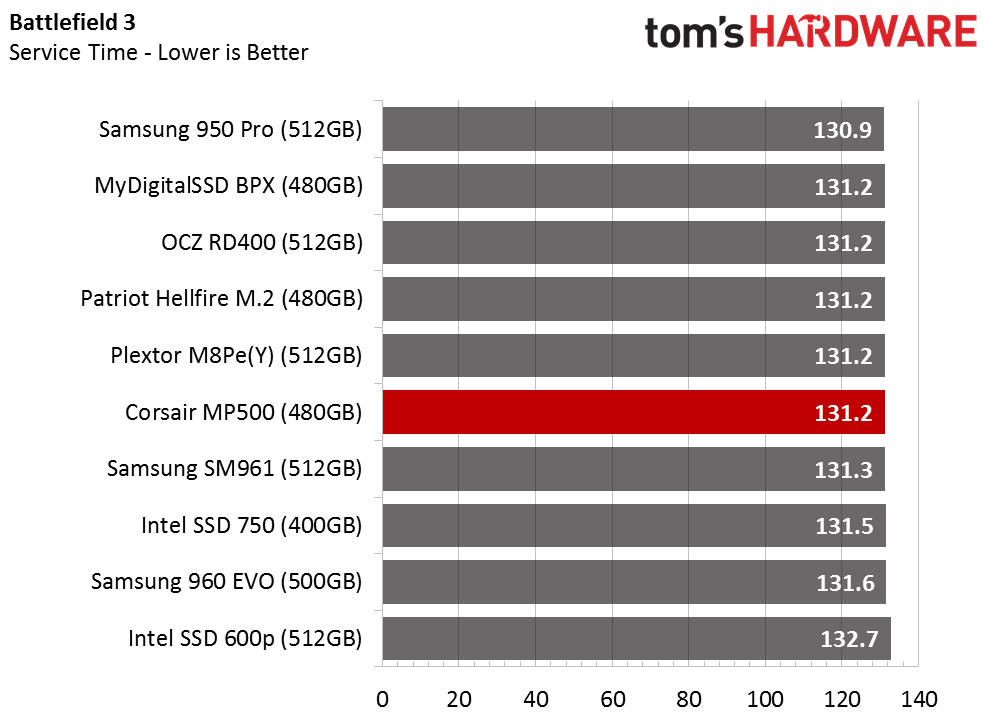
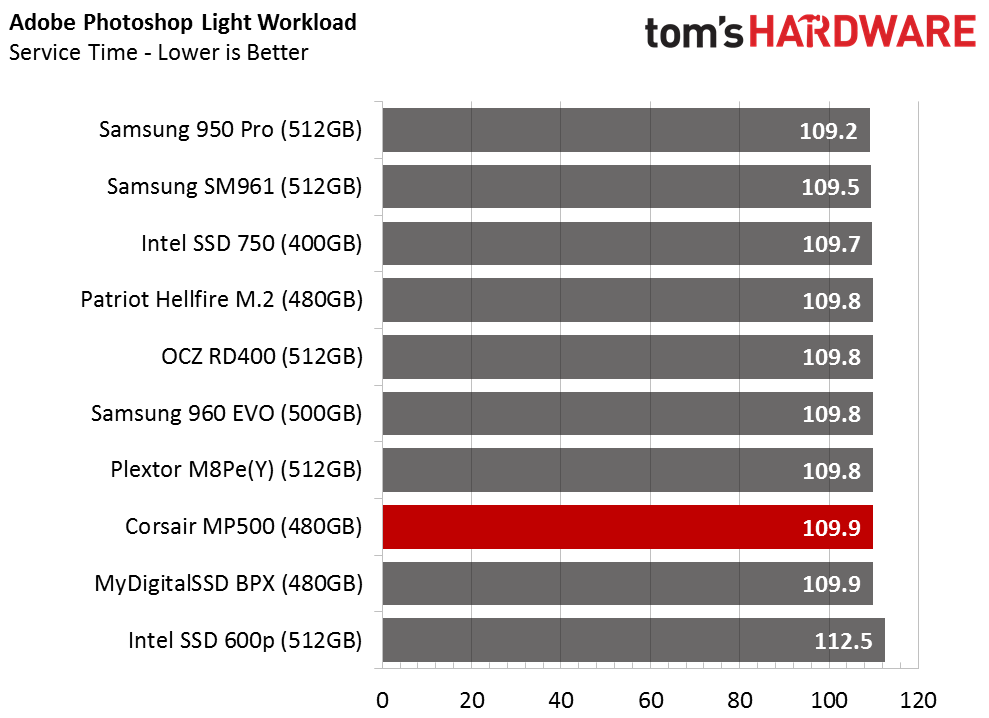
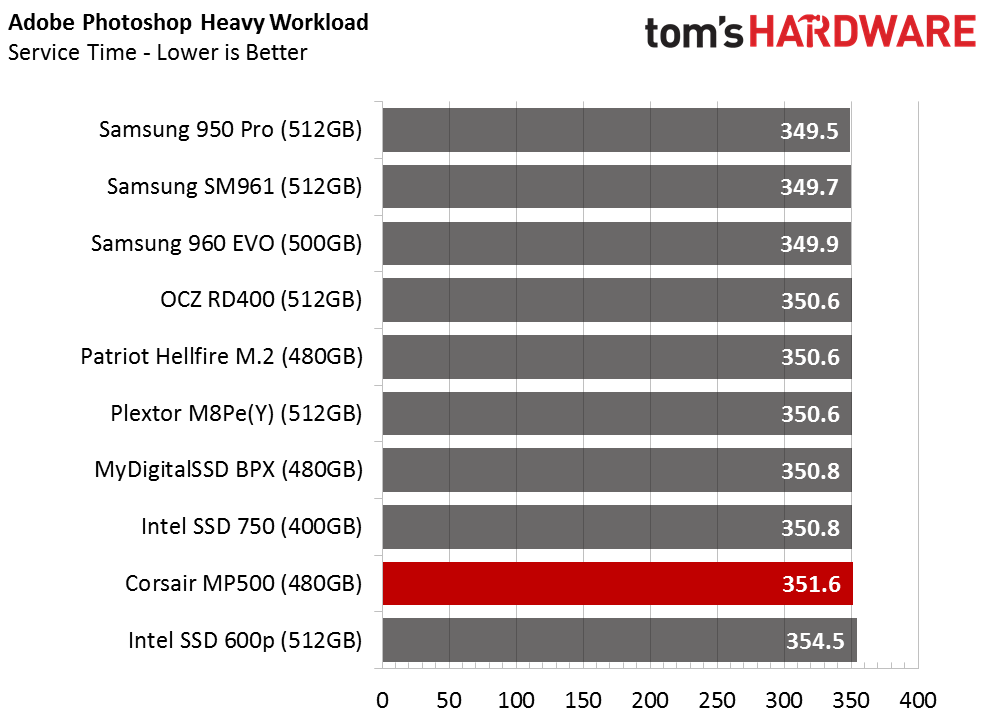
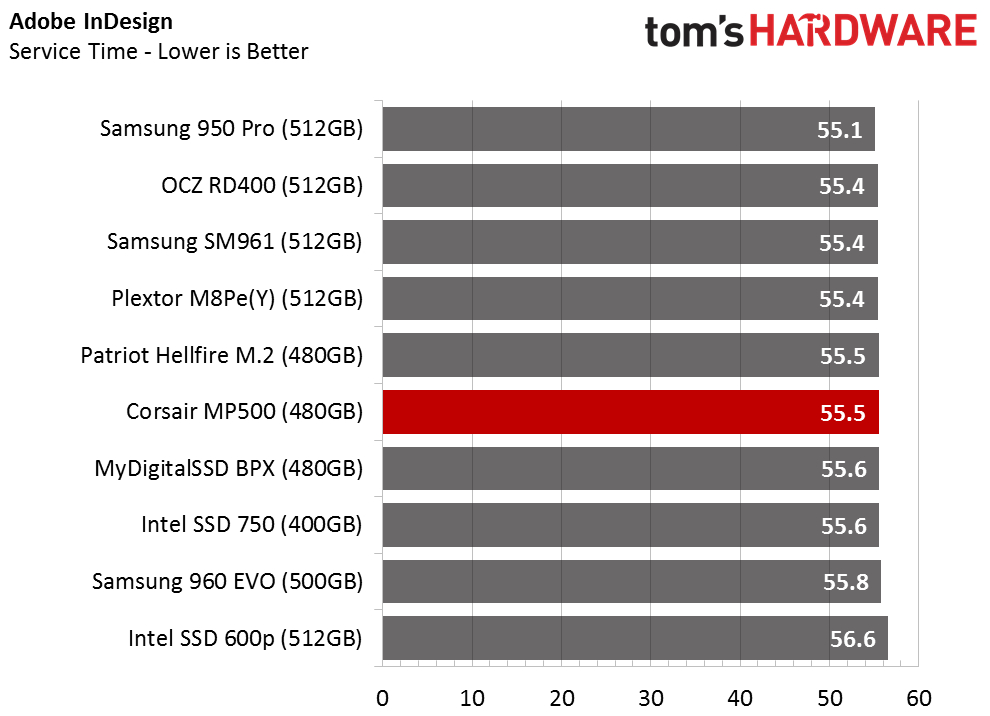
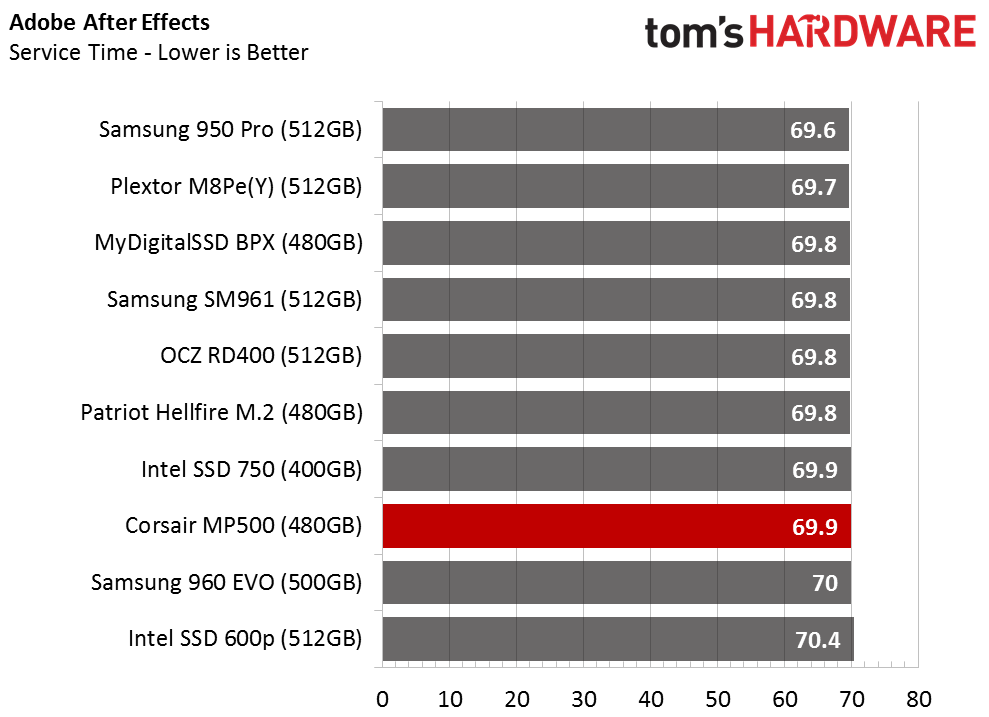
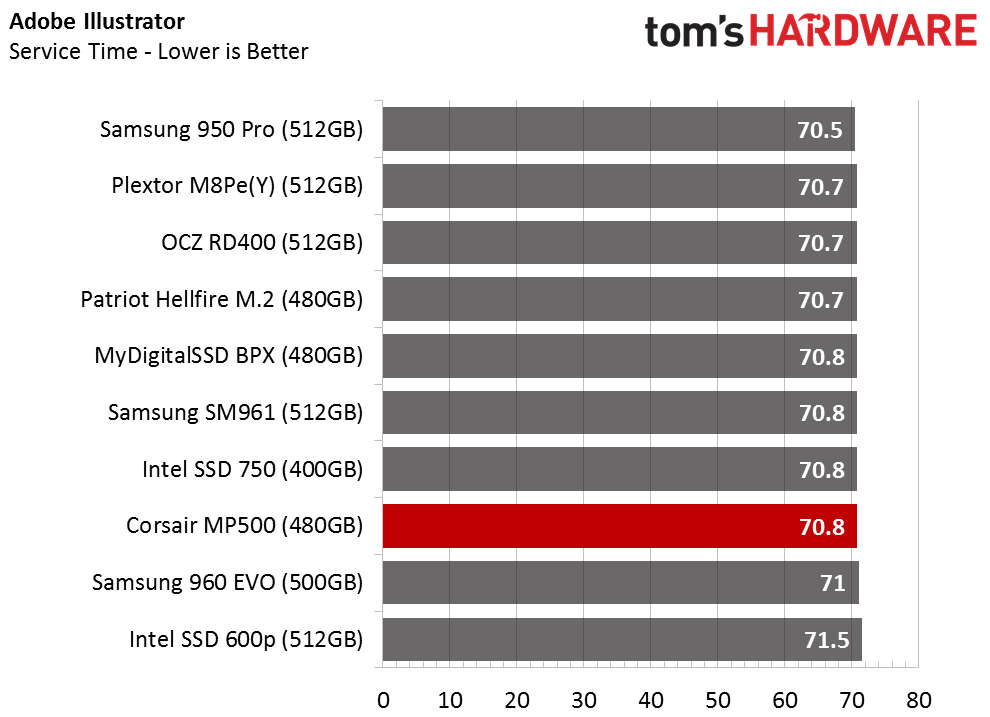
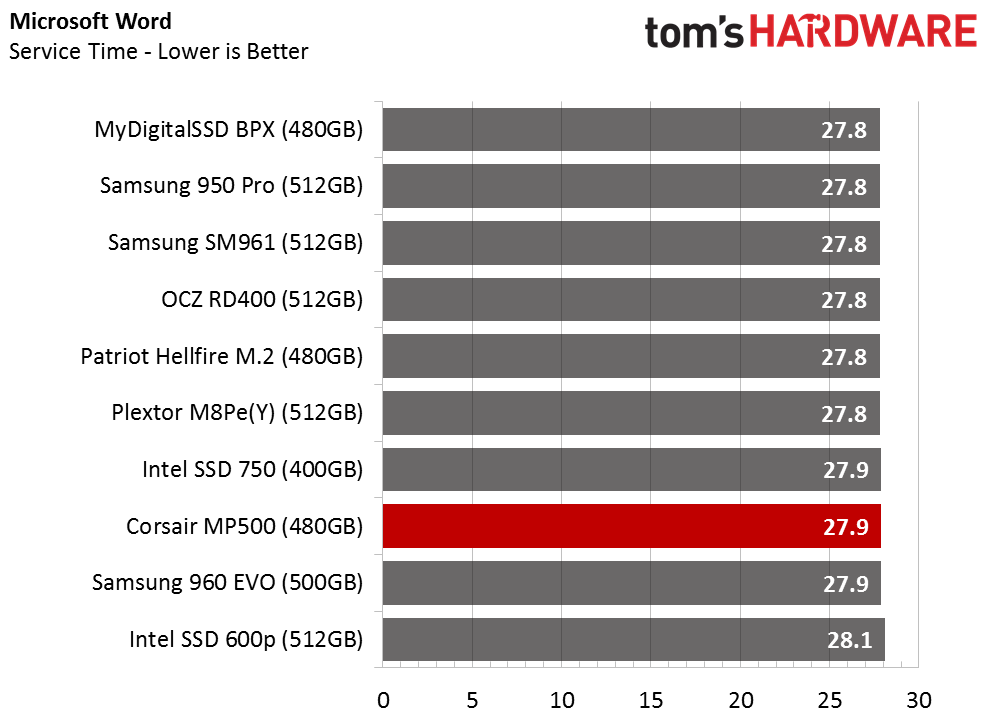
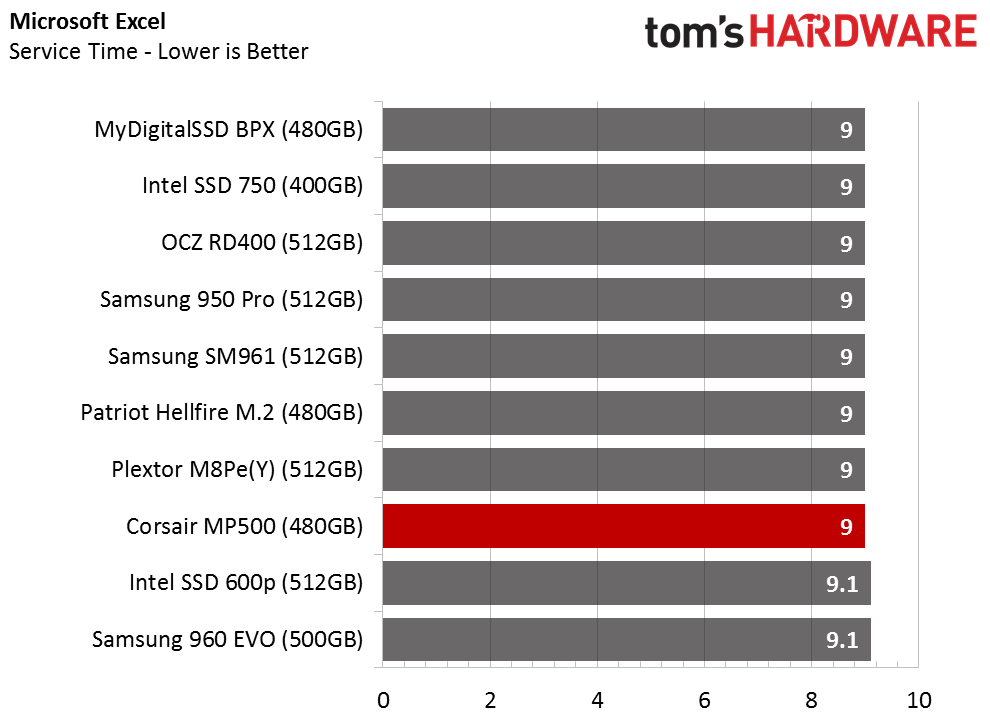
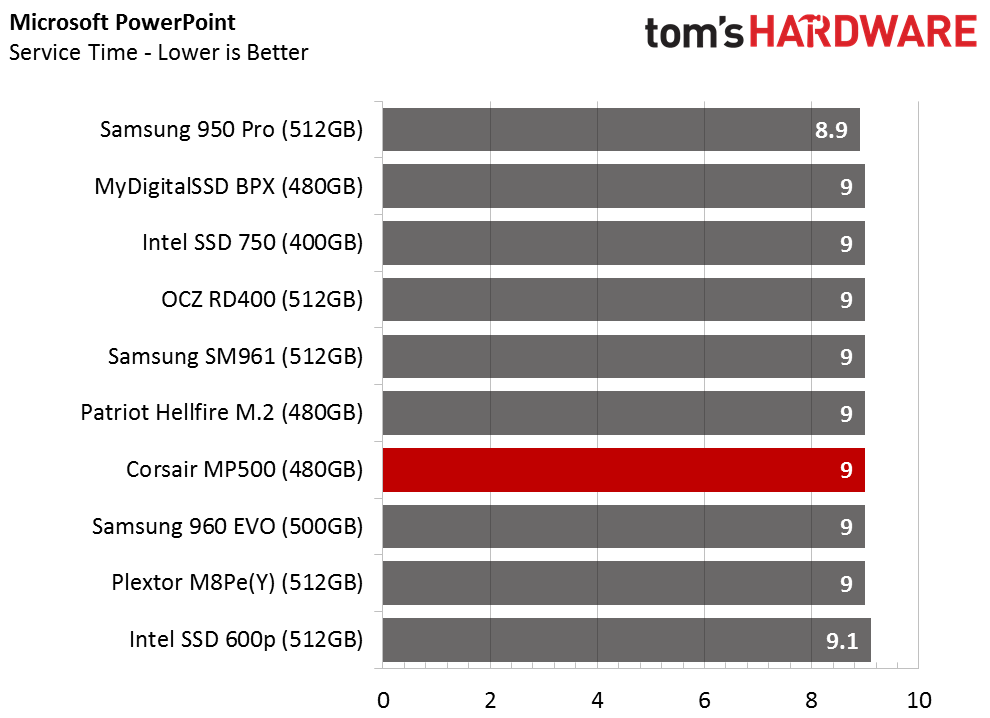
The Corsair Force Series MP500 480GB delivers strong performance in the real-world software tests compared to SATA-based SSDs. The drive looks average compared to other NVMe SSDs during light workloads.
Application Storage Bandwidth
We averaged the results and then present the data as an easily-digestible throughput value. The Force Series MP500 480GB failed to outperform the mainstream Patriot Hellfire M.2 and low-cost MyDigitalSSD BPX, and both use the same controller. It did run over the Intel SSD 750 Series 400GB, 600p 512GB and Samsung 960 EVO 500GB to some degree. It seems we're getting to a point with NVMe that we observed with SATA--many of these products perform about the same and you rarely spot a difference.
PCMark 8 Advanced Workload Performance
To learn how we test advanced workload performance, please click here.
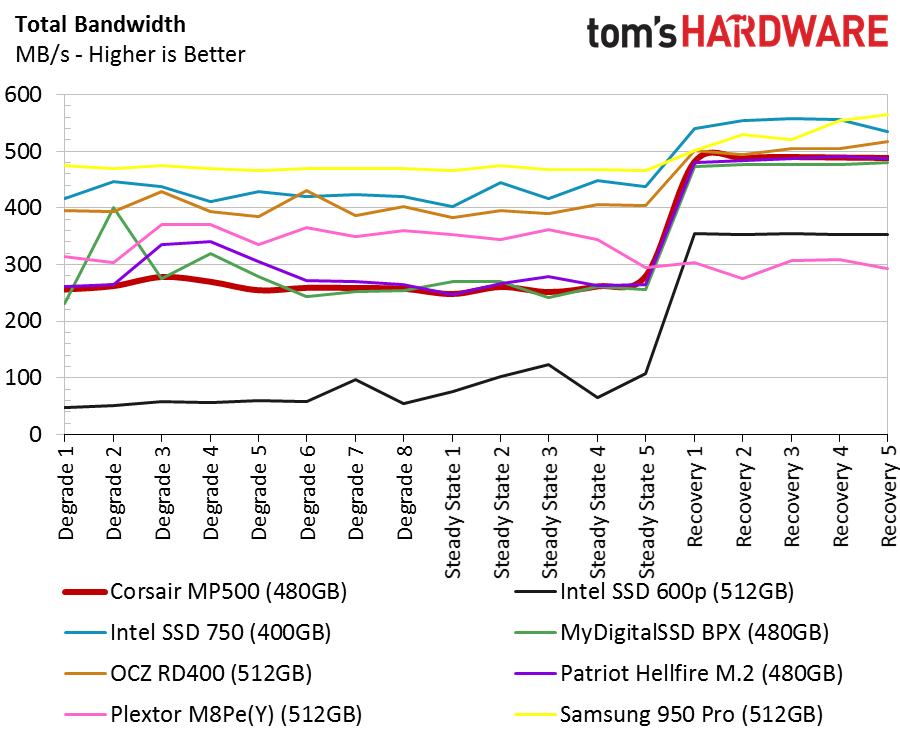
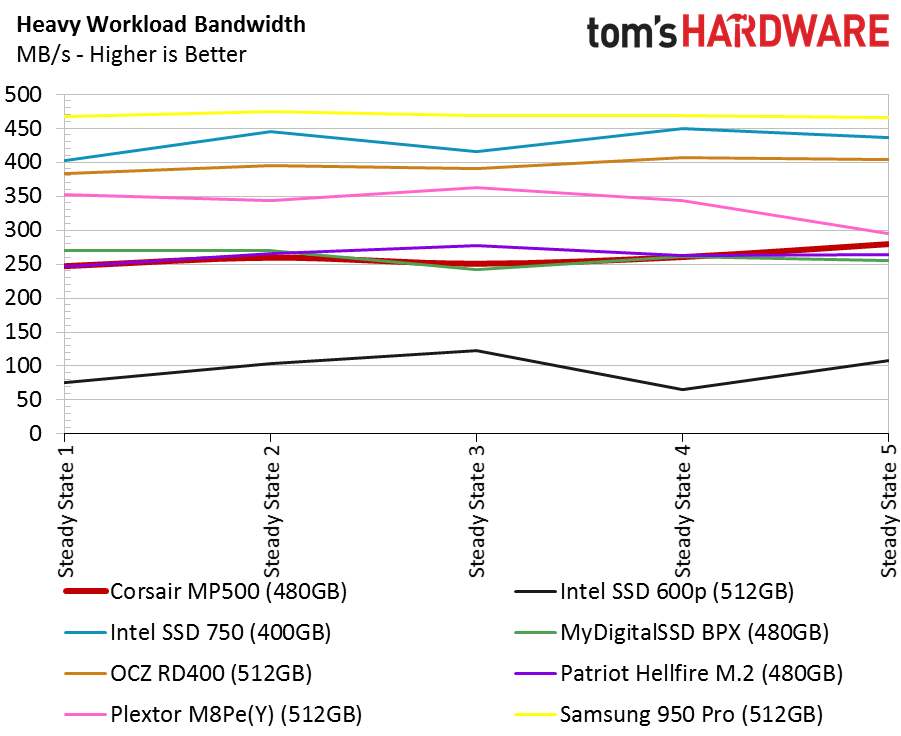
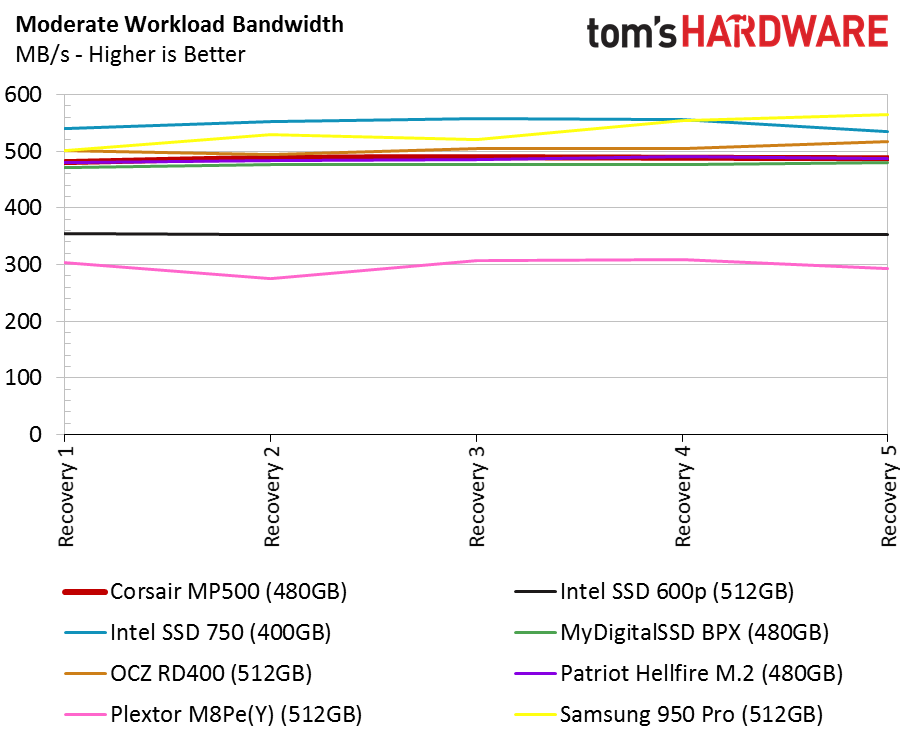
By this point, we didn't expect the Force Series MP500 480GB to be much different than the smaller model we tested on the previous page. The drive does deliver higher performance under lighter workloads than the smaller SSD, but you will notice the increase in normal use. The larger competing SSDs also perform better as capacity increases.
The MP500 performs very well during normal light workloads, but under heavy use, it can't keep pace with some of the other drives that may have been built with workstation use in mind.
Total Service Time
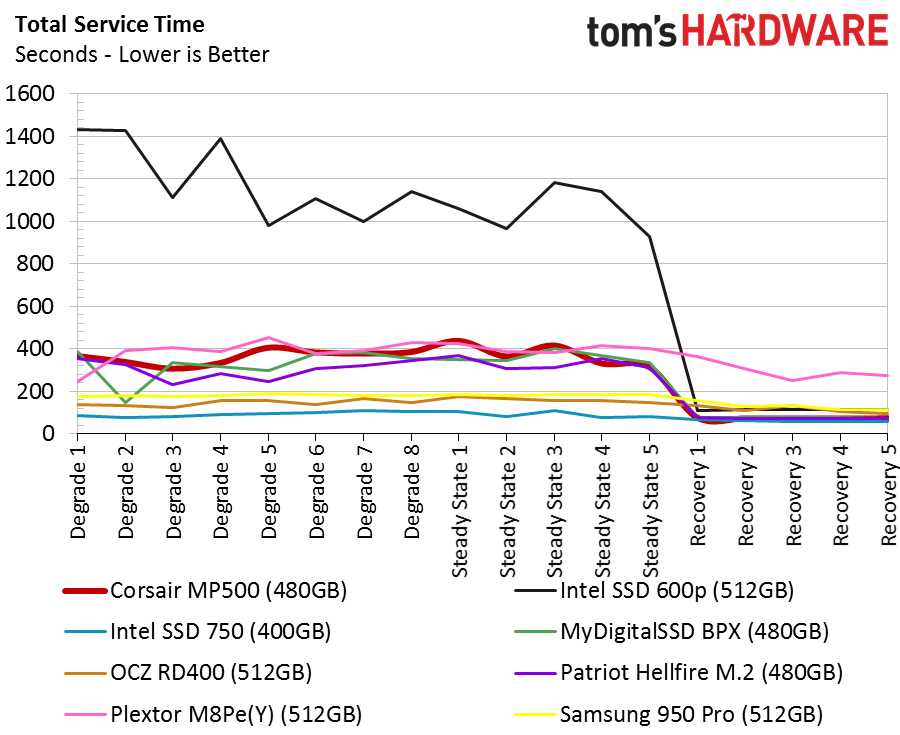
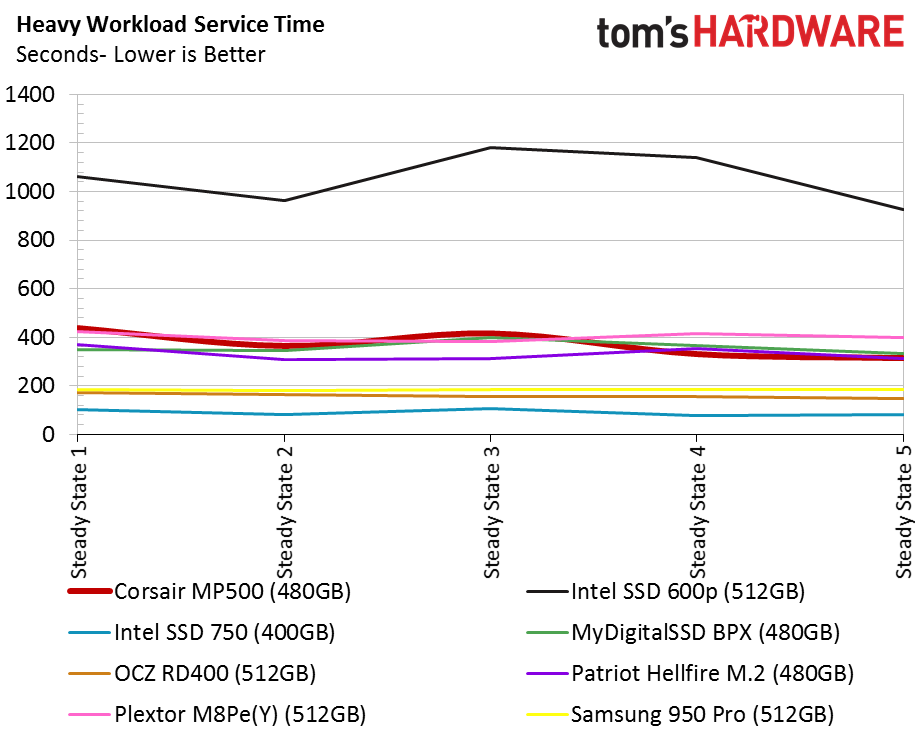
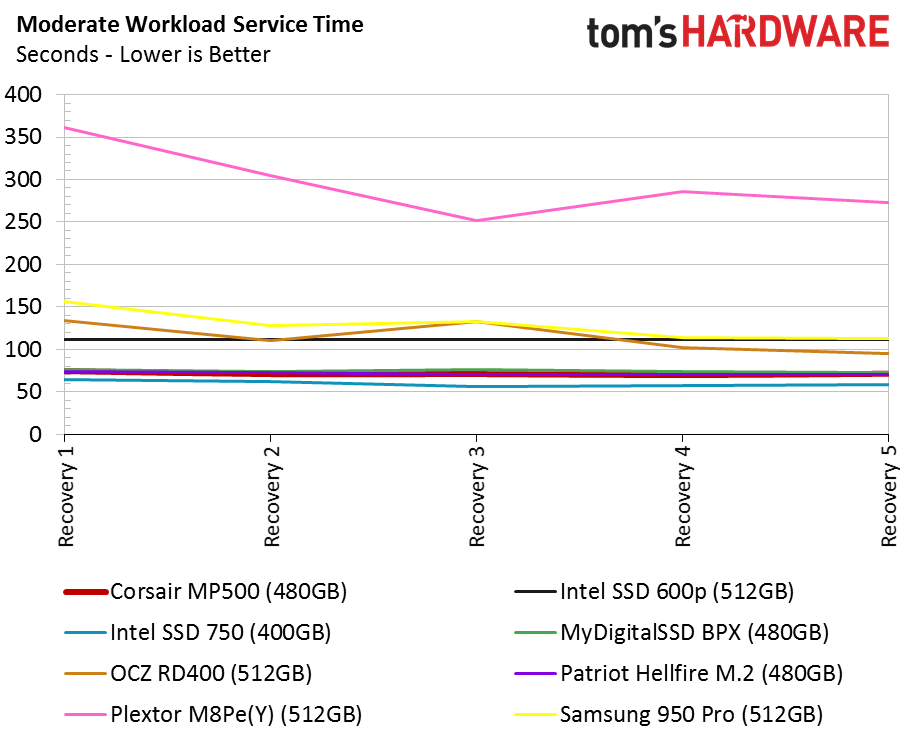
The disk busy time test backs up the data presented in the throughput tests. If priced aggressively, the MP500 could be a very good SSD for gamers and users with read-heavy workloads. Even if you edit a lot of video, the drive is still faster than the best SATA products on the market.
Disk Busy Time
Data passes over the bus when the CPU requests it, but it's not a constant stream. The disk busy time test measures how long the drive is active before it completes the entire workload. There are some processing time and non-storage related activities that add storage idle time, but we only show the active portion of the test.
Notebook Battery Life
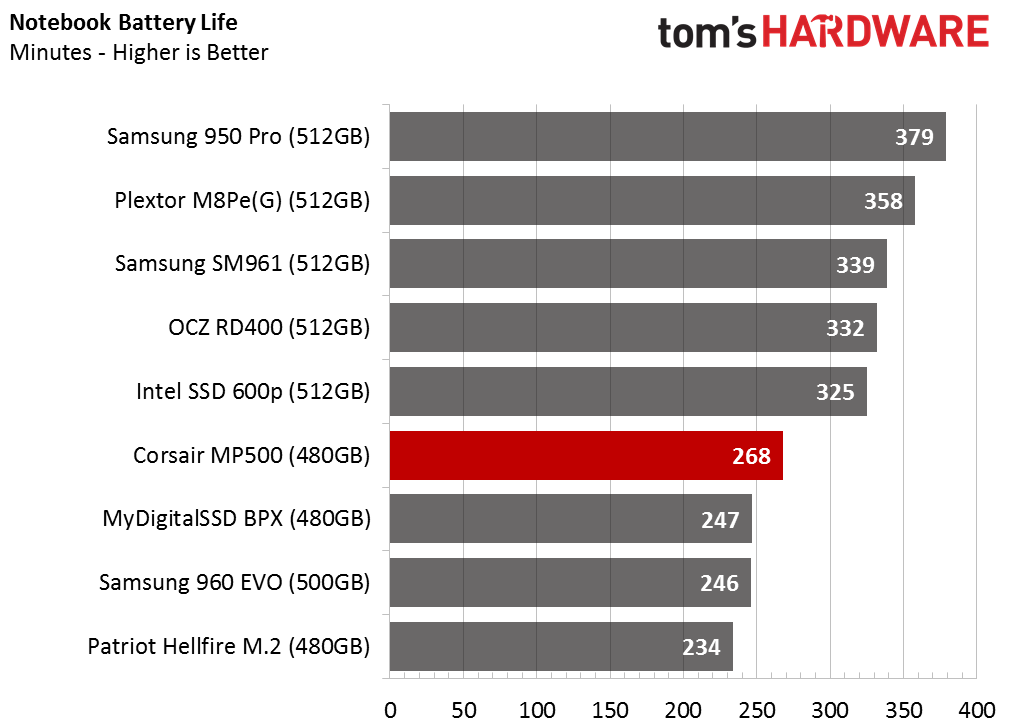
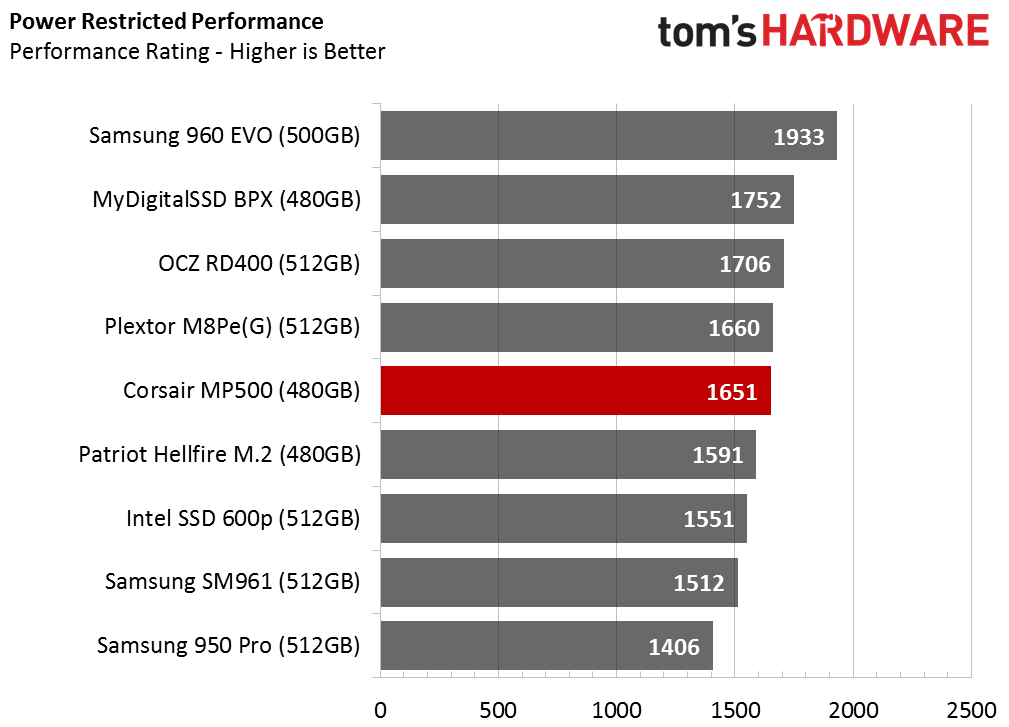
Phison E7 SSDs have historically scored low in our notebook battery life test. We received some push-back about our results that we measured with a Lenovo Y700-17 gaming notebook. Phison tells us that internal tests with Acer notebooks provide more competitive results, but we have yet to test with a non-Lenovo system.

Chris Ramseyer was a senior contributing editor for Tom's Hardware. He tested and reviewed consumer storage.
-
bmguyii The real world tests seem to indicate that all of the choices are on par and that the diffs in the specialized tests mean nothing to real world. Buy the cheapest one with the best warranty that doesn't eat your battery life. Spending 2X for <1 second?Reply -
Bruce427 Not a bad review, but for about $55-$60 less (in the 240GB capacity) I will stick with the MyDigital BPX (2 year longer warranty and double the TBW endurance rating).Reply -
Nossy Meh, People still buy Corsair's memory and SSDs? I've never had one that lasted. Either a dead stick or a failed SSD. Stopped buying them for two years now. Crucial and Samsungs never gave me any problems.Reply -
xXBananasXx Reply
Bought a 4x4gb ddr3 1600mhz Corsair Vengeance back in 2012. Still running strong.19244999 said:Meh, People still buy Corsair's memory and SSDs? I've never had one that lasted. Either a dead stick or a failed SSD. Stopped buying them for two years now. Crucial and Samsungs never gave me any problems.
-
Elysian890 Reply19243373 said:typeo in the description of the RAM, it say MB instead of GB
1024MB = 1GB
No one's going to die because of that lol

